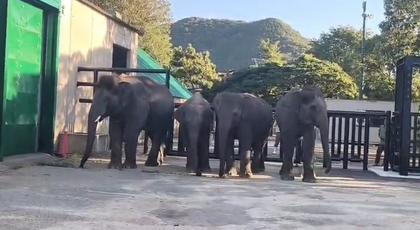Bannerughatta Biological Park calls translocation of elephants to Japan 'unprecedented achievement', thanks Centre
By IANS | Updated: July 28, 2025 17:49 IST2025-07-28T17:41:42+5:302025-07-28T17:49:39+5:30
Bengaluru, July 28 After the successful relocation of four elephants from Bannerughatta Biological Park (BBP) in Bengaluru to ...

Bannerughatta Biological Park calls translocation of elephants to Japan 'unprecedented achievement', thanks Centre
Bengaluru, July 28 After the successful relocation of four elephants from Bannerughatta Biological Park (BBP) in Bengaluru to Japan, A.V. Surya Sen, Deputy Conservator of Forests and Executive Director of BBP, said on Monday that the translocation is an unprecedented achievement and thanked the Union government.
In a first-of-its-kind international transfer, four elephants from Bannerughatta Biological Park -- Suresh (8), Gauri (9), Shruti (7), and Tulsi (5) -- have been successfully relocated to Japan, where they have begun a new chapter of their lives.
The elephants were airlifted from Kempegowda International Airport in Bengaluru to Kansai International Airport in Japan's Osaka on July 24, aboard a Qatar Airways B777-200F cargo aircraft.
After a journey lasting over eight hours, they arrived safely in Japan on July 25. From there, they were transported in specially designed cages by road to Himeji Central Park, their new home.
Surya Sen has issued a press statement in this regard.
The statement said, "The Bannerughatta Biological Park (BBP) in Bengaluru proudly announces that four elephants have been successfully translocated to Himeji Central Park in Japan -- an unprecedented achievement in its history and a milestone in international wildlife collaboration."
"This complex and delicate animal exchange programme was made possible through the collective efforts, coordination and dedication of various departments, institutions and individuals across India and Japan," Surya Sen said.
"Special thanks to the Animal Quarantine and Certification Services in Bengaluru, and the Union government's Department of Animal Husbandry and Dairying, for conducting the complete health certification and quarantine inspections, thereby ensuring the fitness of the animals for international travel," he added.
"We are grateful to the Embassy and Consulate of Japan in India for their diplomatic facilitation, documentation support and cooperation throughout the process. Their role was instrumental in ensuring smooth coordination between the two countries," Surya Sen said.
"This successful relocation demonstrates our shared commitment to wildlife conservation, ethical animal management, and international collaboration. It sets a positive precedent for future partnerships aimed at conserving global biodiversity and fostering educational exchange across borders," he added.
"We express our gratitude to Sunil Panwar, Indian Foreign Service, Karnataka Zoo Authority Member Secretary, Central Zoo Authority and the Union Ministry of Environment, Forest and Climate Change for their timely approvals and permissions. We also thank the Chief Wildlife Warden and the Karnataka Forest Department for granting the necessary permissions and for their unwavering support for the smooth translocation of the animals," he noted.
"We are sincerely grateful to the Directorate General of Foreign Trade and the Wildlife Crime Control Bureau for facilitating the issuance of the Convention on International Trade in Endangered Species of Wild Fauna and Flora (CITES) permit to ensure full compliance with international wildlife trade regulations. We appreciate the excellent logistical management of Goatrade Farming Co. Ltd. and Global Cargo Services for ensuring seamless transportation and timely cargo movement. Our sincere appreciation also goes to the Kempegowda International Airport authorities and the airport authorities in Japan for their professionalism and meticulous handling of this special wildlife transport," Surya Sen underlined.
He also said, "At the heart of this achievement is the dedicated team at Bannerughatta Biological Park -- our veterinarians, mahouts, kavadis and support staff -- whose tireless efforts ensured the health, comfort and safety of the elephants at every stage. We commend the Himeji Central Park team for their collaboration, preparation and warm welcome of the animals upon arrival."
Earlier, the authorities had said, "This exchange, in the planning stages since 2023, was made possible through collaboration between the Central Zoo Authority, the Embassies of Japan and India, and various other departments. In preparation for the relocation, the elephants underwent three months of specialised training. A dedicated team -- comprising two veterinary officers, four mahouts, a supervisor, and a biologist -- accompanied them and will remain in Japan for 15 days to help the elephants adapt to their new environment."
The park is expected to soon welcome rare species such as cheetahs, jaguars, pumas, chimpanzees, and capuchin monkeys, in exchange of elephants from Japan, offering wildlife enthusiasts the opportunity to witness exotic animals in enriched habitats.
Bannerughatta Biological Park is a designated section carved out of Bannerughatta National Park (BNP) in 2002.
Located near Bengaluru city, within the hills of the Anekal range in Karnataka, Bannerughatta National Park spans across two districts: Bengaluru Urban and Bengaluru South.
It was declared a national park in 1974.
The park is part of an important wildlife corridor for elephants, connecting the B.R. Hills and the Sathyamangalam forests.
It is contiguous with the Talli Reserve Forest in the southeast and the Bilikal Forest in the south.
Bannerughatta Biological Park is also notable for being the first biological park in India to establish a fenced, forested elephant sanctuary.
In 2006, it became home to India's first butterfly enclosure.
Disclaimer: This post has been auto-published from an agency feed without any modifications to the text and has not been reviewed by an editor
Open in app